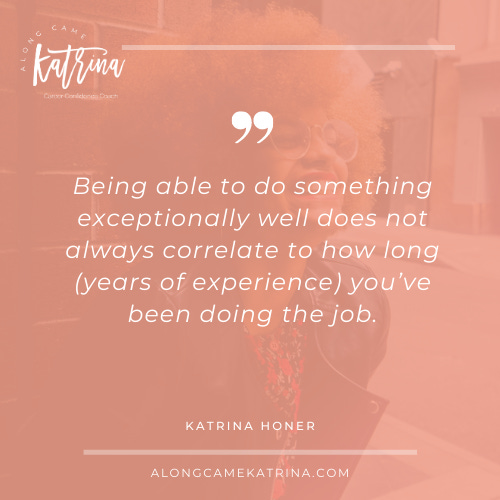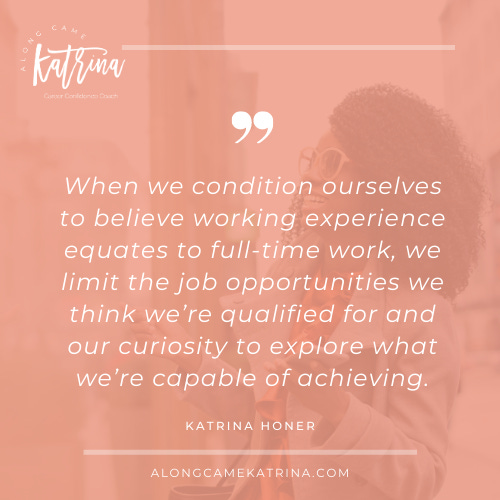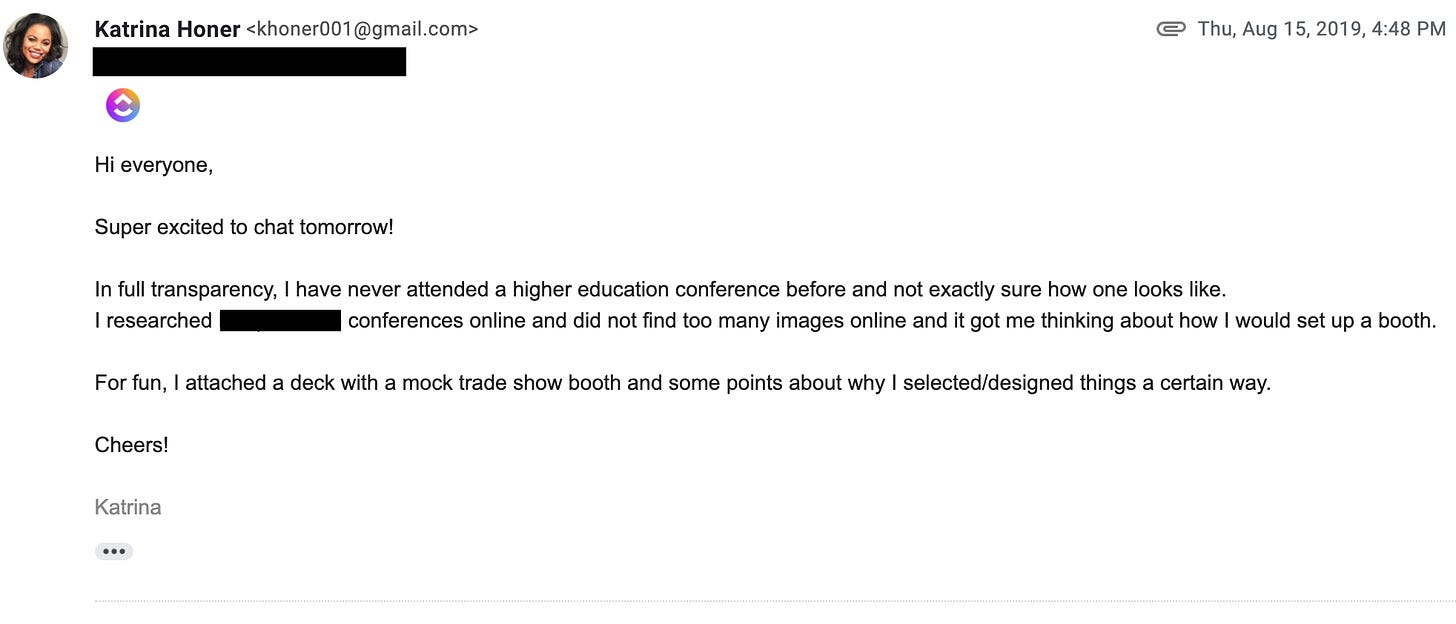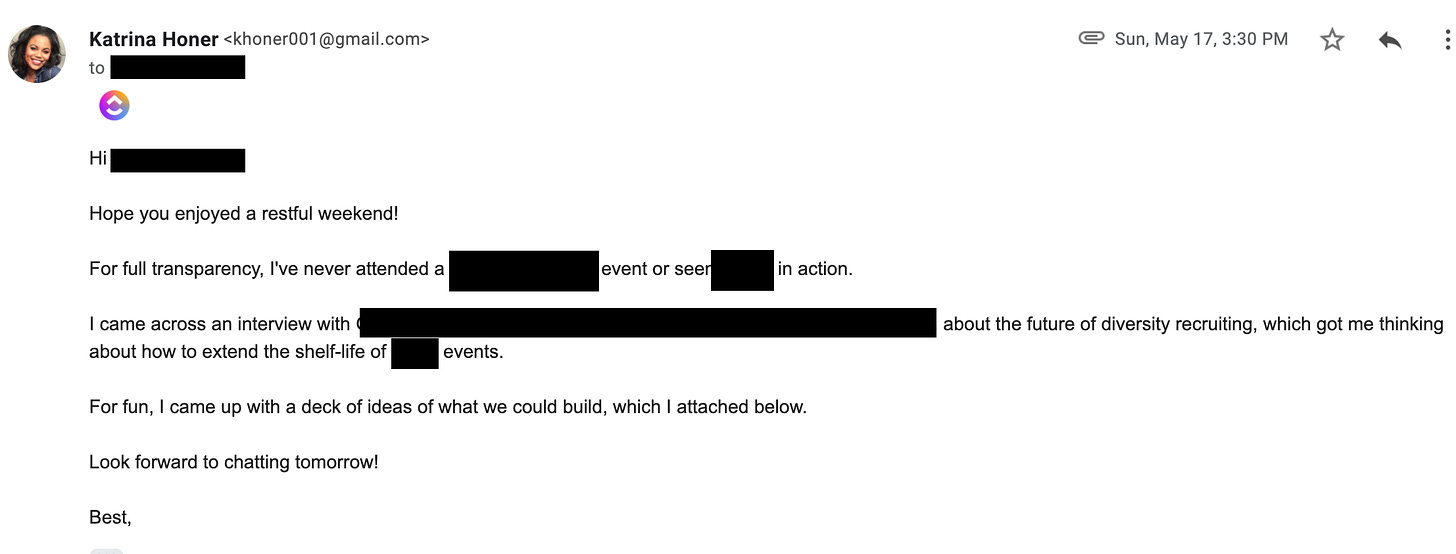Candid Career Advice #2: What "not having enough experience" really means.
Let's clear this up right now—experience doesn't matter
TL;DR - Scroll to the bottom if you want the takeaways. If you like having cryptic job advice debunked and receiving career tips that actually work, I encourage you to subscribe to my weekly newsletter that goes out every Monday morning.
A standard job search is a lengthy process. The average amount of time to find a job is about 9 weeks. However, like most things in life, how quickly or slowly your job search moves depends on several factors including how in-demand your skillset is to the general state of the economy (hello, COVID-19).
For early in career folks and career switchers struggling to find work, I’ve noticed these common roadblocks often cited:
1). The job description says I need X years of experience; I don't have enough and reason why I’m not applying.
2). How can I gain experience if no one will hire me?
3). I got the interview and they hired someone with more experience.
4). I have no real experience in the professional world.
You’ll notice that there’s a lot of talk about “lack of experience.” The problem I have with all of these statements is that we’re making assumptions about what experience is, without understanding what having experience actually means.
How “not having enough experience” is often interpreted as:
If you have not done (X) in a professional setting (on the job) for a specific duration of time, you are not qualified for the job.
How “do you have experience?” should be interpreted as:
Can you deliver on what is expected exceptionally well?
Can you demonstrate a proof of concept that shows you can do (X) exceptionally well?
Proof of concept > experience.
Proof of concept is more important than years of experience. Think about it. Many decisions we make in life are often influenced by some kind of proof that validates or confirms said decision.
How does this apply to your job search?
If you didn’t receive a call back for an interview, it’s most likely because your resume lacks a proof of concept that supports why you are qualified for the job—in this case, that would be the most relevant experiences. (Not all work experience is relevant; I’ll talk more about that in another post.)
If you made it to the interview but were not offered the job, it’s most likely because the hiring manager determined even with all your relevant experiences, someone else was better able to convey and prove they are the best person for the job.
Why having experience DOES NOT matter.
Don’t get me wrong—having working experience is a good thing.
But here’s the caveat: being able to do something exceptionally well does not always correlate to how long (years of experience) you’ve been doing the job. Hence experience does not matter.
Here are some scenarios to consider:
Just because you have (X) years of experience doing (Y), doesn’t mean it’s all relevant experience needed for the new role which you’re applying to.
You can have 10 years of experience doing social media and still be really bad at your job.
You can have 1 year of experience doing social media and be really good at your job.
You can have no previous social media experience at all and still become a viral influencer (I mean, have you seen who’s trending on TikTok lately)?
You can launch a multi-million dollar business without going to business school or college.
Why reshaping how we think about “experience” is imperative for speeding up your job search.
When we condition ourselves to believe working experience equates to full-time work, we limit the job opportunities we think we’re qualified for and our curiosity to explore what we’re capable of achieving.
Instead of looking for jobs where you meet all of the checkboxes listed from the description, you should first look for open roles based on
what you’re good at.
how you can apply what you’re good at to the roles/career fields that most interest you.
You’ll discover a lot more opportunities that are available to you.
But you still need to show a proof of concept if you want to get that interview or job.
And the best way to create a solid proof of concept is by submitting a deliverable with your job application (or during the interview process) that highlights the desired skill set for the desired role. That deliverable could be either
A portfolio:
Maybe your local bakery could use some accounting/marketing/whatever you’re good at help. Volunteering and unpaid work are still professional experience. Whatever you’re doing for your personal side projects also qualifies as professional experience. Document your work and build your portfolio, which you will use as proof to show hiring managers the kind of work you’re capable of.
A value project:
Slightly different than a portfolio, this is a specific deliverable that showcases that value you bring to the company and what the hiring manager would find most valuable. For example, if you’re interviewing for an event coordinator role, you could submit a mock proposal of how to improve their events. (Yes, I’ve done this twice and landed the job both times).
Proof that “proof of concept” actually works:
When I was applying for an event coordinator role (with barely any working experience), the first thing I did was research each company’s pain points and where their marketing was lacking. Then I submitted sample decks and proposals before my interview of how I would improve their events.
My client did the same thing (plus followed my advice about reaching out to the hiring manager/employee directly).
Finally, the takeaways
Not “having enough experience” means failing to demonstrate a proof of concept that you can do (X) exceptionally well.
A proof of concept is more important than experience because being able to do something exceptionally well does not always correlate to how long (years of experience) you’ve been doing the job.
Professional experience is not limited to full-time work (volunteering and personal projects also count).
The best way to develop a proof of concept is to build a portfolio or submit a “value project” that showcase the value you bring to the company + what the hiring manager would find most valuable.
What do you think about “years of experience” versus “proof of concept?” Let me know in the comments below!
Ciao for now,
Katrina








